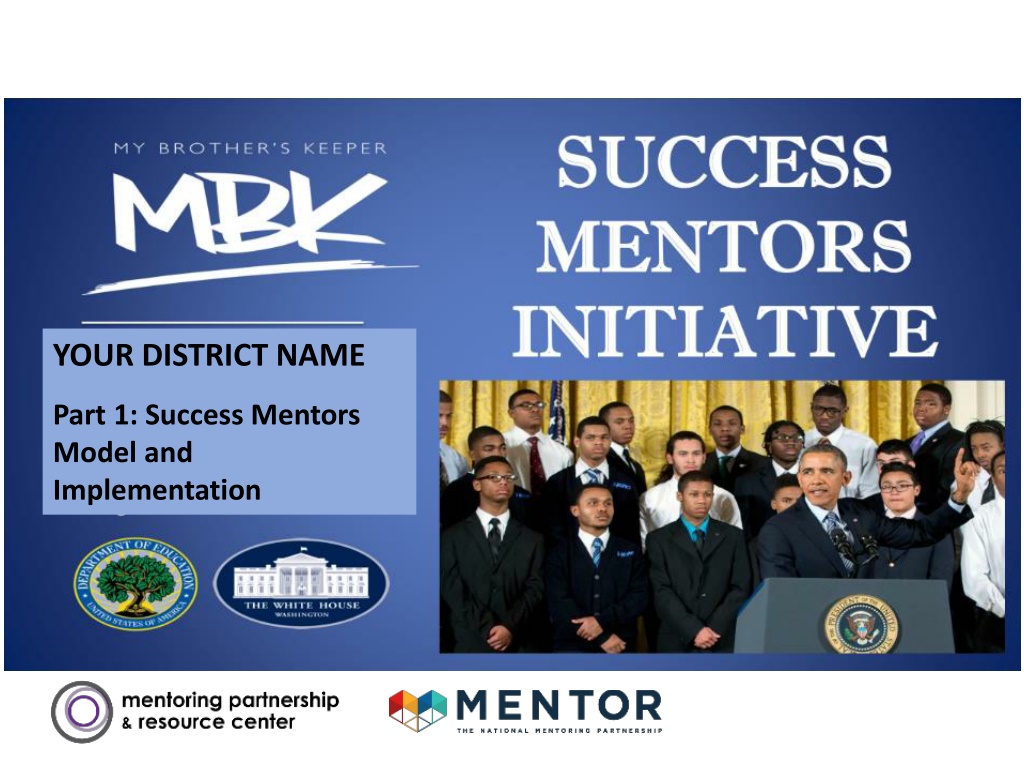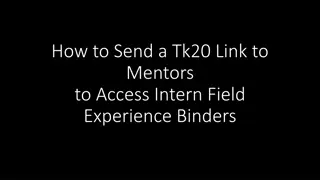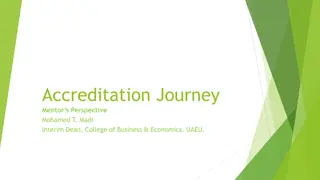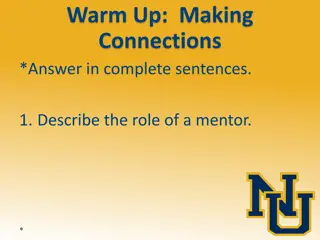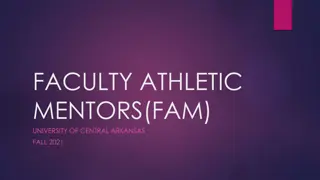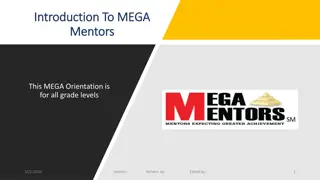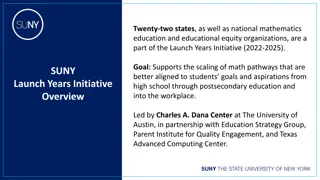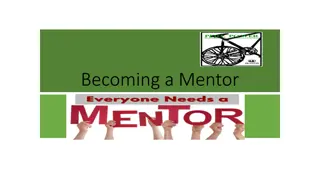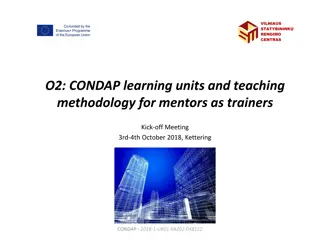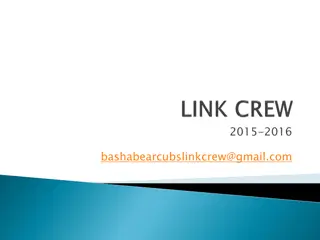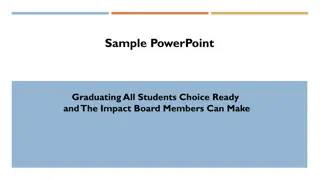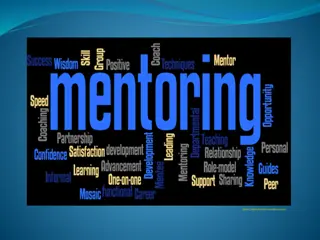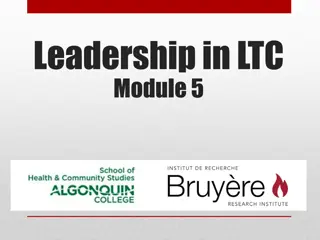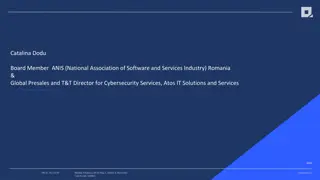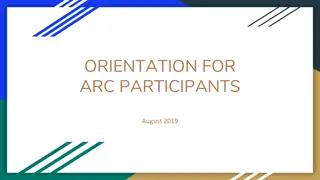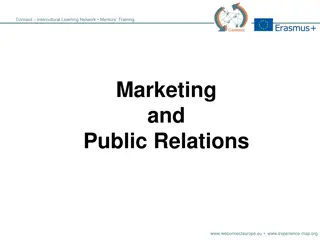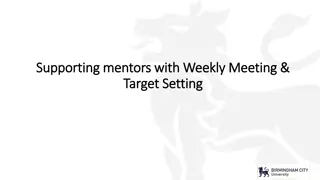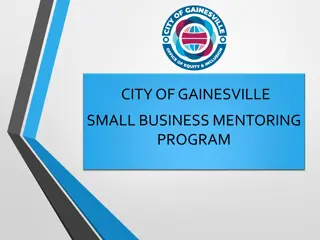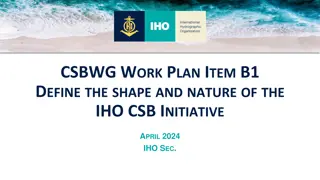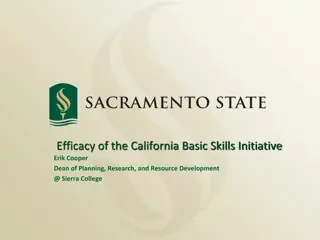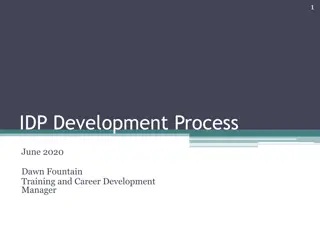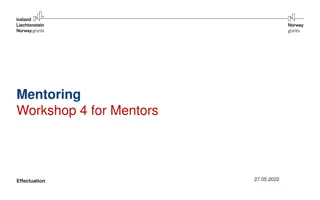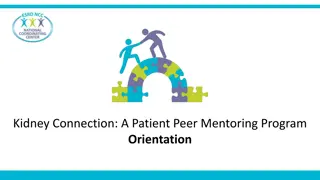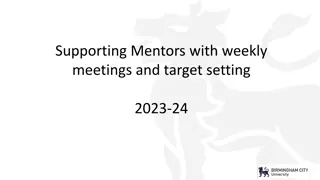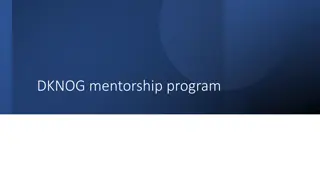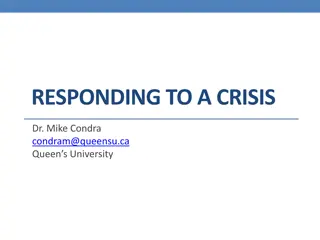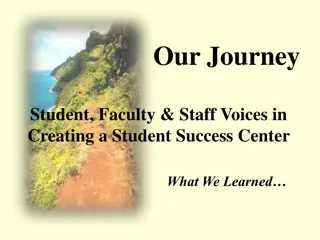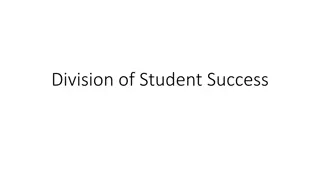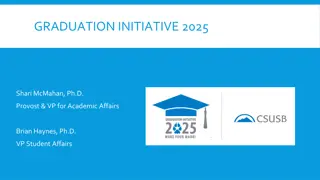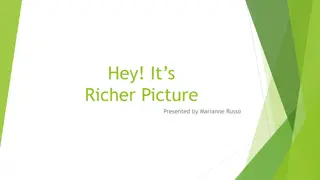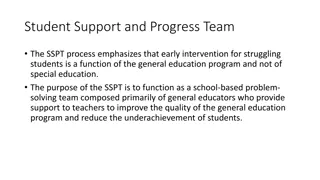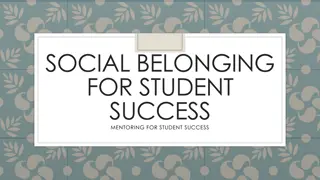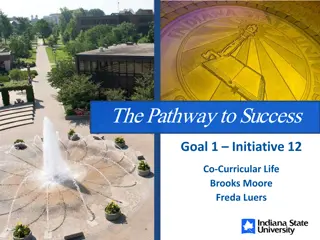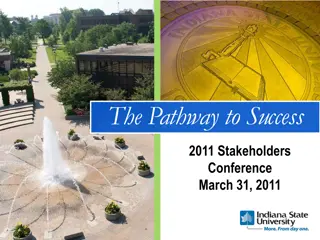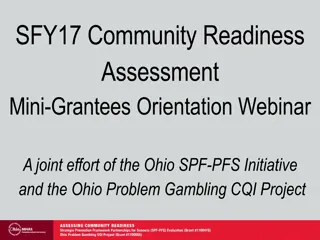Enhancing Student Success Through Success Mentors Initiative
The Success Mentors Initiative, a model implemented in schools, aims to address chronic absenteeism through a data-driven approach combined with personalized mentorship. By leveraging existing resources and partnerships, it targets students missing more than 10% of school. Evidence supports its impact on improving school readiness, academic performance, and graduation rates while combating the school-to-prison pipeline.
Download Presentation

Please find below an Image/Link to download the presentation.
The content on the website is provided AS IS for your information and personal use only. It may not be sold, licensed, or shared on other websites without obtaining consent from the author. Download presentation by click this link. If you encounter any issues during the download, it is possible that the publisher has removed the file from their server.
E N D
Presentation Transcript
YOUR DISTRICT NAME Part 1: Success Mentors Model and Implementation
Success Mentors Initiative WELCOME! Trainer Name, Title, Organization TRAINER HEADSHOT HERE email phone website One sentence explanation of Trainer/Org s relationship to School District and Success Mentors YOUR LOGO HERE
Your Logo Here Your vision here Your mission here 3
Success Mentors Initiative What is it? Source: The Everyone Graduates Center, Johns Hopkins University An Evidence-Based approach - can be flexibly adapted to different circumstances and intensities of student need (NYC Pilot) Combines data analytics (weekly data meetings) with the human touch (Mentors) Uses new applications of existing school and community resources to drive impact (School Staff and City Year Corps Members) Intervention for Chronically Absent students missing more than 10% of school for any reason (excused, unexcused, etc.)
Success Mentors Initiative Why are we doing this? Clear evidence shows chronic absenteeism undercuts school improvement efforts for the students who need them the most: Impact of Pre-K and K on School Readiness Third grade reading performance Eighth grade math performance High school graduation rates College and career readiness Source: The Everyone Graduates Center, Johns Hopkins University
Success Mentors Initiative Why are we doing this? Chronic absenteeism is also an entry point for the School to Prison Pipeline : Source: The Everyone Graduates Center, Johns Hopkins University
Success Mentors Initiative Source: The Everyone Graduates Center, Johns Hopkins University
Success Mentors Initiative The Evidence Source: Meeting the Challenge of Combating Chronic Absenteeism, Balfanz and Byrnes Chronic Absenteeism can be reduced and it s impacts reversed. Modest investments can bring large returns. Evidence from NYC: Students with prior histories of chronic absenteeism with a Success Mentor gained nearly two additional weeks of school (9 days), which is educationally significant. In the top 25% of schools, students with Success Mentors gained one additional month of school. High School students with Success Mentors (including those overage for their grade) were 52% more likely to remain in school the following year. Mentees reported they liked having a mentor and the mentor helped improve their attendance, schoolwork, motivation, and confidence.
Success Mentors Initiative The Model Source: Every Student Every Day 1. District and Principals see Success Mentors as an enabler and an accelerator 2. Student Success meetings are held weekly in which schools monitor data and check on student progress 3. Success Mentors meet with mentee in school 3 times per week; receive training (MPRC) and support (School Counselors); access to student s attendance data 4. Welcoming School Climate, positive messaging about attendance, and connections to student and family supports 5. Districts are supported by: MBK communities, MENTOR Affiliates, Everyone Graduates center at Johns Hopkins, City Year, Attendance Works, US DOE Implementation Guidebooks
Success Mentors Initiative Implementation in YOUR DISTRICT District Captain Name District Captain Title, Organization Contact info Other Resource Name. Other Resource Title, Organization Contact info
Success Mentors Initiative Next Steps -Review the US DOE 2016-17 Success Mentors Implementation Guide -Review the MENTOR Checklist for Launching and Supporting a Mentoring Program -Use the National Mentoring Resource Center to request Technical Assistance -LOCALIZED NEXT STEPS
Your District Name Part 2: Evidence Based Mentoring
Predictions, Acknowledgements, & Disclaimers (PADs) 13
A MENTOR IS a caring guide, a wise advisor, a partner on a journey, a trusted friend. A mentor can serve as a mirror for the youth. They can show youth who they are and all they can become...what makes a mentor a Mentor is not that they are perfect or always know exactly what to say, but rather that they are able to form a strong connection with their mentee. This connection can serve as a catalyst for positive change and growth. Source: B.R.A.V.E. Program Peer Mentoring Handbook 14
MENTOR ROLES & GUIDELINES A Mentor is A Mentor is not Friend Judge Coach Surrogate Parent Listener Babysitter Confidant Professional Counselor/Social Worker Guide ATM Role Model Taxi driver Advocate Academic Teacher Connector Source: The Institute for Youth Success at Education Northwest
WHAT DOES RESEARCH SAY? Length + Strength = Better Youth Outcomes Realistic Expectations = Longer Length Developmental Approach = Better Strength Source: Building Relationships With Youth in Program Settings: A Study of Big Brothers/Big Sisters (1995) Morrow & Styles 16
A PRESCRIPTIVE MENTOR Focuses on perceptions of child s deficits Gives advice more than listens Tries to fix their mentee Controls choices of activities Judges mentee 17
A DEVELOPMENTAL MENTOR Listens and asks questions Gives the youth a voice and choice Focuses on having fun Refrains from judging
DEVELOPMENTAL vs PRESCRIPTIVE QUIZ! Scenario #1: Liz skipped school today. Your response: A - Liz, you don t know it now, but school is really valuable and when you are older, you ll understand. I hope you don t do this again. 20
DEVELOPMENTAL vs PRESCRIPTIVE QUIZ! Scenario #1: Liz skipped school today. Your response: B - Liz, I really get how tough school can be. Remember when you told me how important it is to you to pass your classes? I you were me, how would you like me to respond? 21
DEVELOPMENTAL vs PRESCRIPTIVE QUIZ! Scenario #1: Liz skipped school today. Your response: C - Liz, skipping school is not ok. If you do it again, we aren t going to be able to go to the movies this weekend. 22
DEVELOPMENTAL vs PRESCRIPTIVE QUIZ! Scenario #1: Liz skipped school today. Your response: D - Can you tell me why you made that choice? 23
DEVELOPMENTAL vs PRESCRIPTIVE QUIZ! Scenario #2: Alberto has confided in you that his best friend, Tony, has just joined a gang. Your response: You explain that gang life is dangerous and tell Alberto that he is on the right track to avoiding the gang. 24
DEVELOPMENTAL vs PRESCRIPTIVE QUIZ! Scenario #2: Alberto has confided in you that his best friend, Tony, has just joined a gang. Your response: Wow, that sounds really scary to me. How does that sound to you? 25
DEVELOPMENTAL vs PRESCRIPTIVE QUIZ! Scenario #2: Alberto has confided in you that his best friend, Tony, has just joined a gang. Your response: You ask Alberto how he feels about Tony s decision. 26
DEVELOPMENTAL vs PRESCRIPTIVE QUIZ! Scenario #2: Alberto has confided in you that his best friend, Tony, has just joined a gang. Your response: It sounds like you shouldn t hang out with Tony anymore. Who are some friends that aren t in the gang that you can spend more time with? 27
DEVELOPMENTAL WORKS BY Enhancing social relationships and emotional well-being Improving cognitive skills (dialogue & listening) Positive identity development (role modeling & advocating) Source: A Model for the Influence of Mentoring Relationships on Youth Development (Rhodes, 2006) 28
AN INSTRUMENTAL MENTOR Focuses on: Learning skills Achieving goals Critical Thinking 29
RESEARCH ON DEVELOPMENTAL & INSTRUMENTAL Both approaches are needed Developmental activities help build trust Instrumental activities open up opportunities for growth Source: Mentoring Programs: A Framework to Inform Program Development, Research, and Evaluation (2006) Karcher, et al. 30
TOP 10 TIPS FOR DEVELOPMENTAL APPROACH 10) Be A Friend 9) Have Fun 8) Give your Mentee a Voice and Choice 7) Be positive 6) Be Open 31
TOP 10 TIPS FOR DEVELOPMENTAL APPROACH 5)Let your mentee take the lead with what you talk about 4)Respect the trust your mentee places in you 3)Help build your mentee s confidence 2)Listen 1)Take responsibility for building the relationship 32
District Name Part 3: High Quality Mentoring with the Elements of Effective Practice for Youth Mentoring
Predictions, Acknowledgements, & Disclaimers (PADs) 34
Matching Expressed preferences of mentor, mentee, and parent Interests Proximity Availability Age Goals Gender Strengths Race Previous Experiences Ethnicity Personality 35
Initiation http://i.huffpost.com/gen/2627570/images/o-YOUTH-MENTOR-facebook.jpg Formal Start to Relationship In-Person with Program Staff and Parent/Guardian Sign Written Agreements Establish Clear Expectations 36
Monitoring & Support is the process of providing mentors and mentees with resources, assistance, and positive reinforcement. involves problem-solving for each unique situation. offers care to volunteers, youth, and parents/ guardians (if appropriate) throughout the duration of the match. 37
Monitoring & Support Common themes and questions to ask include: How often are matches meeting? Are program rules being followed? Is there commitment on both sides for the relationship? How is communication going? Any warning signs of child safety issues? What kind of help or support can the program provide? Any grievance or positive developments to report? Is necessary data being turned in to the program? 39
Closure Plan for the end from the start Make ending gradual Celebrate and frame as positive Ensure no one takes ending personally Conduct exit interviews individually Bring together to say goodbye and share 41
Success Mentors Initiative Next Steps -Review the US DOE 2016-17 Success Mentors Implementation Guide -Review the MENTOR Checklist for Launching and Supporting a Mentoring Program -Download and review The Elements of Effective Practice for Youth at mentoring.org -Use the National Mentoring Resource Center to request Technical Assistance -LOCALIZED NEXT STEPS
